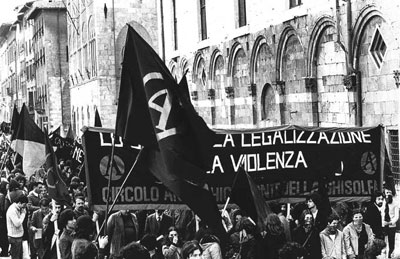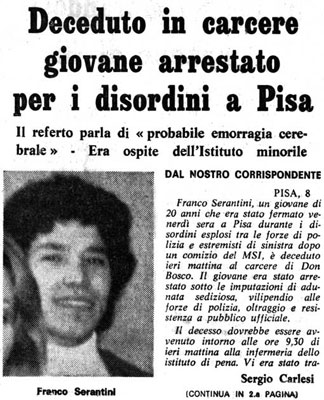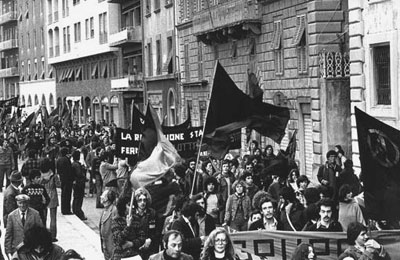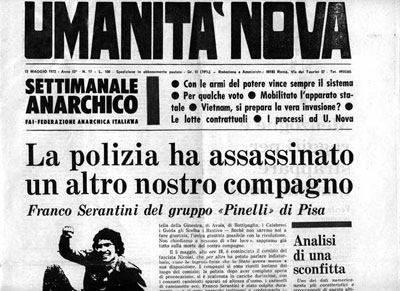
E And finally, on April 14, 2011, the work of young composer Francesco Pisano Filidei, NN On the death of the anarchist Serantini, made its debut on Italian soil, for the most in his ideal setting, the Teatro Verdi in Pisa. Really unexpected choice of the Normal School to include this work in their concert program, usually characterized by more blunt classicism. Moreover, the prolonged absence from the national theater of this composition (after a triumphant first in Monaco in 2009, and an equally successful participation in the Festival of Music in Strasbourg in 2010) had reached many dimensions of a real scandal, especially given the close connection with one of his most painful and significant moments in our recent history. In any case, the excellent performance of the ensemble Neue Vocalsolisten Stuttgard ed Ars Ludi, for the direction of Erasmus Gaudiomonte, amply rewarded the wait.
 To be a composition of contemporary music, NN performs its task admirably. Opera from the organic atypical (six items and six percussionists), sometimes seems almost a compendium of everything that the twentieth century has invented, tested, found in music. There are intricate vocal warps to Ligeti, more or less explicit references to Orff and Boulez, and then experimental harmonies, animal cries, screams. And nothing of what we feel is left to chance: every little sound event has been put in the score. This is, in short, a real "job well done", and has the advantages as well as defects: does not disappoint but not surprise, not a masterpiece but you can not really define a small business. The weakest point, if anything, is to act as his tribute to Serantini. A little 'as a Bach Passion, in fact, NN is the story of the last hours of the subversive. One wonders, however, if a composition of this kind is the best way to tell a story made up of injustice and anger.
To be a composition of contemporary music, NN performs its task admirably. Opera from the organic atypical (six items and six percussionists), sometimes seems almost a compendium of everything that the twentieth century has invented, tested, found in music. There are intricate vocal warps to Ligeti, more or less explicit references to Orff and Boulez, and then experimental harmonies, animal cries, screams. And nothing of what we feel is left to chance: every little sound event has been put in the score. This is, in short, a real "job well done", and has the advantages as well as defects: does not disappoint but not surprise, not a masterpiece but you can not really define a small business. The weakest point, if anything, is to act as his tribute to Serantini. A little 'as a Bach Passion, in fact, NN is the story of the last hours of the subversive. One wonders, however, if a composition of this kind is the best way to tell a story made up of injustice and anger.
Francesco Filidei told several times the genesis of this work. He did so even during the conference held at the Teatro Verdi in the afternoon of the same April 14, meeting which was attended also by the artistic director of the Association of the Normale Carlo De Incontrera, the historian Marco Revelli and that Corrado Stajano from which everything was beginning. The origin of NN, in fact, is his essential text of 1975, the subversive. A Filidei happen to read it by chance during a trip to Paris, his current residence. The suggestion for the figure of Serantini, which, incidentally, shares the Sardinian origins, it quickly turned into an inexhaustible source of research ideas and visions. The young composer began an intense process of reflection on death, life, on their origins, about the seventies, culminating in the realization of this "gift in music."
Yet, listening N.N., many things are wrong. Franco Serantini was a curious boy and a little 'wild, open to the world. This, however, is convoluted and academic work. Franco Serantini was moved to political activism by the sense of sharing and community that he received, a feeling that he had never known until it arrives in Pisa. This, however, is a book that chooses to be for "a few", and it does sound very brain using a vocabulary and a booklet (the philosopher Stephen Busellato) and experimental anti-narrative. Far to imitate human voices the sound of police sirens is really so helpful in explaining what they meant for street demonstrations Serantini and his companions? Was it really necessary to give voice to the whole Sardinian fauna to make us live the nostalgia of Franco for his land? And then have tried really Serantini, this nostalgia for his years in Sardinia, when he was a teenager and only embittered, intolerant host of a dismal school of nuns?
The work is divided into seven figures: The Manifestation, The first song, III first Intermezzo, IV Prison, V the second Intermezzo, VI Canto second, VII funerals. The two songs are nothing more than two lullabies: the first, in Italian, singing to himself Serantini dying and dying, the second, in the Sardinian dialect, is a sort of reunion with her mother and native land . As is evident from the scheme as soon as the track and as you rightly pointed out De Incontrera during the aforementioned meeting with the author, the general structure is chiastic type, pattern typical of many sacred works of Bach, applicant, for example, in Sing. But the Christological allusions do not end here. The middle section, the prison, appears as a grotesque "last supper" with lots of glasses and cutlery, and more is divided into three parts with subsections of thirty-three measures each. The choice is very apt: if you will, the story of Serantini can really be seen as a gospel, with as much death and resurrection. Serantini rises to new life each time an artist, whether writer, composer, painter or poet, chooses to tell the tragic life and the even more tragic end. Perhaps this is the only thing missing in NN, perfect compendium of twentieth century music, virtuoso exercise of writing music. What is missing is Franco Serantini.
 Federico Russo
Federico Russo

Answers Francesco Filidei
Dear Federico Russo, I read with great interest the review that you wanted to devote to the version of Pisa NN performed April 14 at the Teatro Verdi. It is certainly not the task of an artist to respond to the criticism that it receives except through their work, but the work you have proposed, rather than presenting an analysis of the intrinsic efficacy of NN seems to constitute a clear rejection of the use of "educated" language extraction in order to evoke the figure of Franco Serantini.
In his denial of any emotional value to the work, considered a mere academic exercise, it seems to me also take a reaction to what may 'have seemed a misappropriation of the image of the young martyr, which no doubt he is tied in some way different. Do not believe that I have not asked whether it was lawful or not for this work to construct a language that most likely the same would have branded Franco Serantini, at least at first, as an academic, and we would like to give to you some considerations, convinced that, while not accepting it, he has incorporated the concept behind the work better than many others. Firstly I think the question to be answered is whether it makes sense to persevere today in a conception of art that seem to belong only to times past: access to means of mechanical reproduction was shocked at how to use the music, and speed of transformation of society seems to find a nearly perfect match only in the use of disposable music that need not be recorded on paper. More serious perhaps it might appear, compared to the anarchist theme, the need to write music, a single architect who draws up the project so dictatorial.
No apparent involvement of the public then, obliged to follow a given path, unable to dance, sing, move freely, speak. How to combine these conditions with a subject such as this?
 The answers I give, I'm not sure what could make a scholar of the subject, but I hope I can still be a witness to a personal reflection.
The answers I give, I'm not sure what could make a scholar of the subject, but I hope I can still be a witness to a personal reflection.
The music is a unique tool for questioning about the death and therefore life. A composition work in time, the size of the one part to another and those cuts allows us to closely observe the birth and death. Be outdated, presenting an art form that seems to belong to the past work in the memory brings with it this sense of death in an even more compelling way. If at the same time, these forms within it a glimpse into the unknown, adds momentum to the memory of the past to the future of this essential transmission. The music is now unfortunately almost only used to hide, stun, to sell products. It occurs everywhere, like a buzz that prevents the silence and has become something to listen but not something to stop listening and stop listening to is an effective political tool to control a society. Submit a music not to hear but to listen is one of the attempts that a "committed" composer should be imposed today.
This play requires a submission to a discipline that is still limited in time, active participation is only deferred, in short, if all together we always talk about not going anywhere (which actually seems to be very current). Allow me also to make them see how the work is called (or not called) NN, Nomen Nescio, and as the death of the anarchist Serantini is only the starting point for research about the death that involves themes such as' identity, relationship with father, mother, death.
The coexistence of these issues does not allow the use of a linear narrative but requires the use of layered temporal forms. Whether we like it or not the story of Franco Serantini transcends Franco Serantini itself and embraces a history of the seventies which has seen next to the pop music, composers such as Nono, conductors such as Abbado, pianists like Pollini, fight sincerely to broaden the concept of music . Still, this music was made, not because "it chooses to be a few" but he will not stop being real, being the theme of the work that the search for a name.
You write that the work lacks Franco Serantini. And yes, Franco Serantini missing, could not be sure, in fact, I want to tell you that we have a long discussion with director Denis Krief how NN is a work on the absence of the subject, in fact the person is missing the funeral rites and celebrated the rite is done by others. If N.N. was able to pass on this lack, his play has not been useless, although I regret not being able to see forward, but only indirectly, the pain I felt in writing every single bar of a job, could you please believe me, is much less academic exercise that you can think of. Sincerely,

